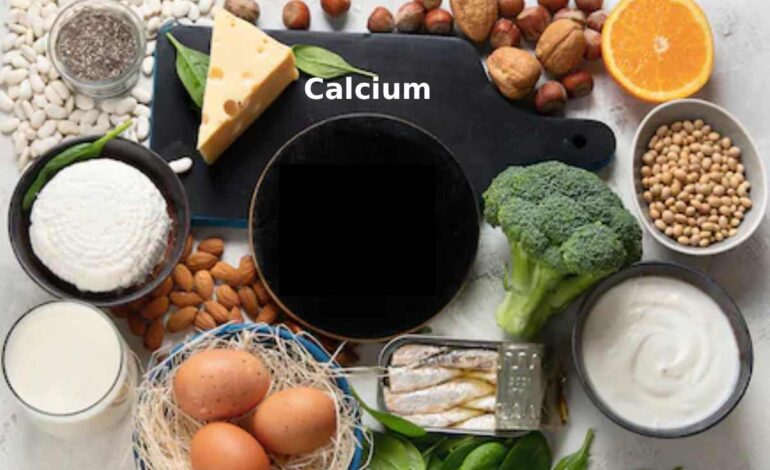Calcium Rich Foods Vegetarian

It is vital to include calcium rich foods vegetarian in your diet regularly for strong bones and teeth. If you are looking for foods that contain calcium, this article covers the top calcium-rich foods available across India – from milk to leafy greens. Let’s dive in and look at the rich sources of calcium.
Calcium is the most plentiful mineral in the body and highly benefits your health. Dairy, as well as a diversity of other meals, can help maintain your calcium levels. By combining a variety of plant-based foods, vegetarian diets can be calcium-rich. Tofu, Sesame Seeds, Chia Seeds, Almonds, Fortified Plant-Based Milk, Leafy Greens, Figs, Soy Products, Fortified Cereals, Blackstrap Molasses, and Seaweed are some of the best vegetarian calcium-rich foods.
You may enjoy the significant advantages of calcium while living a vegetarian lifestyle by integrating these calcium-rich plant-based foods into your diet. Combine these foods with vitamin D sources and other minerals that help calcium absorption to maximize its benefit.
Best Calcium Rich Foods Vegetarian
The following foods are calcium rich foods, vegetarian, and contain no animal-based products.
1. Soymilk (fortified)

One cup typically contains about 300 mg of calcium. Shake up the container before drinking to ensure the calcium isn’t settled to the bottom.
2. Oranges and orange juice (fortified)
A sizable fresh orange will provide you with about 74 mg of calcium. Fortified orange juice can give even more at about 300 mg per 8-ounce glass.
3. Tofu
Make sure that it has calcium sulfate, which you should be able to see on the ingredients. ½ cup of this will offer you around 253 mg of calcium.
4. Kale
The calcium amounts will vary depending on how you purchase and prepare the kale. Fresh kale gives you the most at 100 mg per 1 cup. If you chop and boil that fresh kale, you’re looking at about 47 mg per ½ cup. Frozen kale that’s been boiled and drained will contain around 90 mg per ½ cup.
5. Chia seeds
It is such a simple option to add raw to oatmeal or smoothies. One tablespoon equals about 27 mg of calcium.
6. Turnip greens
Don’t toss those greens away if you buy yourself a bunch of turnips. Use them in salads or sautee them up. Eating 1 cup raw will provide 104 mg of calcium, whereas ½ cup boiled and drained contains 99 mg.
7. Bok choy
A tremendous leafy green to add to Asian-inspired dishes. ½ cup of chopped and boiled bok choy will contain around 79 mg of calcium, while 1 cup of raw will provide 74 mg.
8. Almonds
A portable snack to take with you on the go. ¼ cup of whole, dry almonds gives you 92 mg of calcium.
9. Figs
Craving something sweet? Skip the ice cream this time (dairy-free) and grab a few figs. One fig (about 8 grams) will contain around 14 mg of calcium.
10. White beans
Beans, beans, the magical fruit. And a tremendous vegan calcium source. Navy beans ½ cup 63 mg, beans refried pinto ½ cup 42 mg.
11. Sunflower seeds
It’s a great snack or topping for your salad. One cup of plain unsalted sunflower seeds gives you around 101 mg of calcium.
12. Edamame
1 cup shell contains around 98 mg.
13. Broccoli
Raw or cooked, take your pick! ½ cup boiled and drained broccoli gives you 31 mg, and 1 cup of raw contains 43 mg.
14. Sesame seeds
Another seed that packs a calcium punch. One cup contains 168 mg.
15. Sweet potatoes

Fries, mashed, roasted – potatoes are such versatile vegetables! Get these fantastic orange vegetables into your day. 1 cup raw will give your body 40 mg of calcium.
16. Mustard and collard greens
One cup of raw collard greens contains around 84 mg of calcium, whereas ½ cup of boiled and drained will provide 134 mg.
½ cup of boiled and drained mustard greens may comprise about 83 mg.
17. Okra
An additional versatile vegetable that can be eaten raw, cooked, or pickled. One cup raw contains around 82 mg of calcium.
18. Butternut squash
Don’t wait for the fall to enjoy this vegetable. One cup provides around 40 mg.
19. Arugula
Spice up your salads with this peppery-flavored leafy green. One cup raw will give you around 32 mg of calcium.
20. Fortified cereals and other grains
These foods wouldn’t naturally have calcium added, but they are great options to choose from with the fortification process. The calcium ranges can vary, with the highest being in the thousands and the lowest being closer to 200 mg.
What is Calcium?
Calcium is a chemical component with the sign Ca and atomic number 20. It is an alkaline earth metal and one of the most excellent plentiful minerals in the human body. Around 99% of the body’s calcium store in the bones and teeth, which have structure and strength. The residual 1% is found in the blood, muscles, and other tissues.
What Does Calcium Do for Your Health?
Calcium plays an energetic role in keeping your body healthy. The most common ways are as follows:
- Boosts Bone Health: Calcium helps build strong bones and teeth. Around 99% of calcium on the Earth’s surface resides within your bones and teeth. Its role here is to provide strength and rigidity.
- Aids With Muscle Contraction: Calcium plays an active role in the movement of our muscles. Muscles work due to the electrochemical energy stored in ATP, which helps muscle fiber contraction and relaxation during exercise.
- Helps Control Weight: Calcium can help burn fat and prevent obesity. It assists with improving the metabolism involved in the energy equation.
- Reduces the Risk of Osteoporosis: Calcium is essential to maintain bone mineral density through aging and decrease the chances of having a fragile bone problem known as osteoporosis afterward.
Conclusion
Calcium is an essential mineral that is easy to obtain after the diet. Aim to eat 2 or 3 portions of plant-based calcium per day.
Anyone unable to meet their daily calcium obligation should talk to a doctor about taking a supplement.
Check this website: https://www.hlffitness.com/